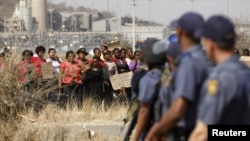South African police shot 34 protesting miners this week after weeks of growing tension. Authorities say the police tried to disperse the demonstrators using tear gas and other non-lethal methods and fired only when charged by an armed crowd.
The protesters, three thousand striking rock drillers, are pressing for a wage increase.
Lucy Holborn, a research manager at the South Africa Institute of Race Relations in Johannesburg, says tension has been mounting.
A week before the shooting, she said, ten people were killed, including two police officers, at the Lonmin mine at Marikana, about 100 kilometers (60 miles) from Johannesburg.
Contributing to the violence, said Holborn, is a turf war between two unions, the Association of Mineworkers and Construction Union (AMCU) and the (dominant) National Union of Mineworkers (NUM). A spokesman for the NUM blamed its rival for the shootings, saying AMCU leaders had urged followers to die defending the hilltop where they were protesting.
Holborn said since the days of apartheid, there has been a culture of protest that often includes violence. She said especially common are what she calls “service delivery” protests over the government’s failure to provide adequate clean water, sanitation and electricity.
“I think a lot of it may be history, that this has become normal and acceptable in South Africa,” she said. “But I think people are raising questions about whether there has also been a lack of leadership on the part of union leaders in the case of strikes and political leaders generally in condemning violence and calling on their members to desist from violent protests. In the absence of that,orHol there may be a sense that it’s justifiable and it’s acceptable.”
Holborn said police behavior is also being criticized.
“There was a particular case, for instance, last year where a protestor was shot at close range with rubber bullets and ended up dying. And that raised quite a lot of attention on this issue of how the police handle crowd situations.”
But she said there’s also a great deal of concern over the amount of force used in ordinary arrests.
“It’s not uncommon to hear of people being shot at in the process of being arrested, although part of that may also result from our criminals being quite heavily armed.”
Public attention is focusing in part on police chief Riah Phiyega, who was hired in June after a career in banking.
“For some time in South Africa,” said Holborn, “there’s been criticism of this idea of having commissioners who are not from the force itself. And I think today in a press conference she’s taken some degree of responsibility…for the instructions to send in this particular tactical team that then ended up shooting at the crowd.
“The concern obviously there is that if she did give orders for this to be the response and it wasn’t just confusion…how does she know what best practice is in policing in this sort of situation without a background in policing herself?”
President Jacob Zuma has announced a commission of inquiry to look into the violence, which he said is unacceptable in a constitutional democracy.
Holbord some believe those who provoke violence often act with impunity.
“There’s a protectorate body here that’s supposed to investigate allegations of police misconduct and it has a very low conviction rate compared to the number of cases referred to it. So I think there’s a concern there that in cases of police brutality or police ill-discipline not enough happens in the end, so it continues unchecked.”
The issue is likely to continue to attract attention. Holborn said unions are an important part of the governing coalition. Government policy towards them is expected to be discussed in December when the ruling African National Congress holds a conference to elect the party president.










